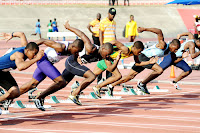Putting Christmas and exercise in the same sentence is about as appealing as being the one stuck with clean up duty after Christmas dinner. It's that time of the year again when food, food and more food features as the dominant factor in our lives. And all the hard work you put into those previous 51 weeks can be undone by a week of guilty pleasures and excuses. So what can you do to avoid over-indulgence and festivity-induced exercise-amnesia? Keep reading to find out!
Christmas is a time of celebration, gathering with family and friends and sharing of food and drink. Yet with the stresses of pre-Christmas shopping, organising and cooking the Christmas meal, many forget their fitness habits. Just because you are on holidays does NOT mean your fitness gets to go too!
So here are 3 of the biggest excuses people make during Christmas and also some tips on how to best turn the situation around and survive the holiday season.
1. I've exercised so hard during the year, I deserve to take a break - even just for this week.
You deserve kudos for keeping up your exercise during the year. But as with many other habits, once you break it (even just for a week) it makes it just that bit harder to get back into it. How many of you have said that "I'll get straight back into it the first week of the new year" only to find you are still struggling to get your regimen in order by Easter?
So here are 3 of the biggest excuses people make during Christmas and also some tips on how to best turn the situation around and survive the holiday season.
1. I've exercised so hard during the year, I deserve to take a break - even just for this week.
You deserve kudos for keeping up your exercise during the year. But as with many other habits, once you break it (even just for a week) it makes it just that bit harder to get back into it. How many of you have said that "I'll get straight back into it the first week of the new year" only to find you are still struggling to get your regimen in order by Easter?
Stick with your exercise but allow yourself a bit of flexibility. Maybe instead of doing your regular gym routine, try a different type of exercise such as a game of beach cricket with the family or a surf in the ocean.
2. I have so much to do during Christmas, I just don't have the time to fit in any exercise.
Amidst the incessant shopping, cooking and gift wrapping, many people struggle to find 5 minutes of free time to themselves. I'm not saying you don't have to go overboard and go to the gym 5 times during the festive week but make sure you do something.
When you wake up, set aside 30 minutes for a walk with the dog or a quick swim. If you exercise in the morning then you have the rest of the day to do everything else and not worry about trying to fit it in and you will also feel more energised.
3. There is so much food at Christmas dinner. It would be rude for me not to indulge and show my appreciation.
This one is a legitimate excuse especially if you are attending multiple Christmas feasts. Your hosts have slaved away in the kitchen for hours and the last thing you want to do is make them feel their hard work has gone unnoticed.
In this situation, the key is portion control. You can eat but make sure you don't OVER-eat. Another key point is to eat slowly and chew your food properly.
And finally, I just want to thank each and every one of you for reading and supporting my blog in 2012 and making it such a successful year. You are the reason I write these articles and I hope you are inspired to make a healthy change to your life.
So just remember you can have your cake and eat it too (just not too much of it!)
So just remember you can have your cake and eat it too (just not too much of it!)
See you in 2013 (or if the Mayan's are correct, happy last day on earth)!
JW








































